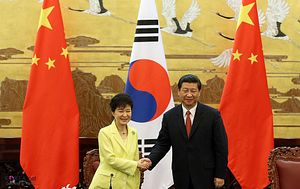South Korea has been caught in the middle of the United States and China as it is asked to make tough decisions that could bring a dramatic change to its relations with the two countries.
The first decision South Korea has to make is whether to support deployment of the U.S.-backed Terminal High Altitude Area Defense missile system (THAAD) in South Korea. The U.S. hopes to deploy THAAD in South Korea to be prepared for possible military provocations from North Korea, but China has raised concern over the idea of a U.S. missile defense system on the Korean peninsula, saying it could threaten “regional” safety.
Whether to join the Asian Infrastructure Investment Bank (AIIB) is the second issue that worries South Korea. AIIB, led by China, is aimed at providing finance to infrastructure projects in the Asian region. The bank is accepting members and is prepared to take off, but the U.S. has encouraged its allies not to join the bank due to concerns about China’s rising power in the world stage.
On the THAAD issue, South Korea emphasizes the so-called “Three Nos”: that there has been no request from the U.S., no negotiation with the U.S., and no decision made. Seoul has repeated the “Three Nos” since THAAD emerged as an issue about a year ago, but the deflection is no longer working. The THAAD issue has become problematic for South Korea’s relationship with China. China’s request to join AIIB has also made the situation tough for Seoul as two issues are mingled.
Amid growing pressure from two countries, South Korea called on neighboring countries to not try and influence its decision on THAAD deployment. Kim Min-seok, a spokesman at South Korea’s defense ministry, said at a regular briefing that neighbors can have their own positions on the (possible) deployment of the THAAD system in Korea, but they should not try to influence South Korea’s security policy. Even though no country was mentioned by name, many see this as South Korea’s message to China that it will eventually take the United States’ side regarding the THAAD issue.
Meanwhile, it is still unclear whether Seoul will join AIIB or not. Ahn Jong-beom, the Blue House’s economic chief, said on March 18 that nothing has been decided regarding AIIB. He stressed that the government has not presented an official stance, nor has it held concrete discussions.
Even though Seoul is being vague about AIIB, the general view is that South Korea will have an easier time making that decision. As many allies of the U.S. have announced they will join AIIB, the U.S. is no longer in a position to tell South Korea not to join. In fact, the U.S. said on March 17 that it is up to South Korea to decide whether it will join the AIIB. That’s a dramatic change from July 2014, when South Korean President Park Geun-hye was asked to join AIIB by her Chinese counterpart Xi Jinping. At that time, the U.S. urged Seoul not to join.
Many think that South Korea will try to balance its diplomatic relations with both the U.S. and China by giving each country what they want: THAAD for the U.S. and AIIB for China. But some say Seoul should be more cautious when it comes to making these decisions, or that South Korea should continue being vague in order to make the most out of its special relationships with two of the world’s most powerful nations.
Against this backdrop, a trilateral meeting between the foreign ministers of South Korea, China, and Japan is scheduled for this Saturday. All eyes will be on the summit, especially on the discussions between South Korea and China.

































